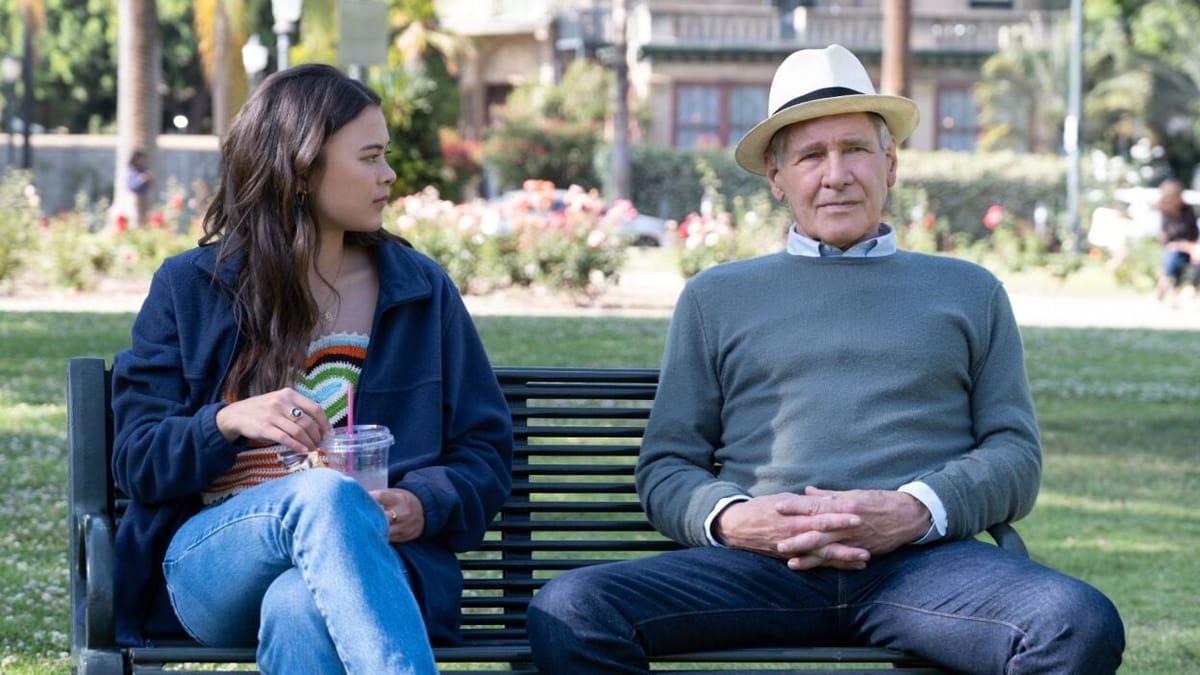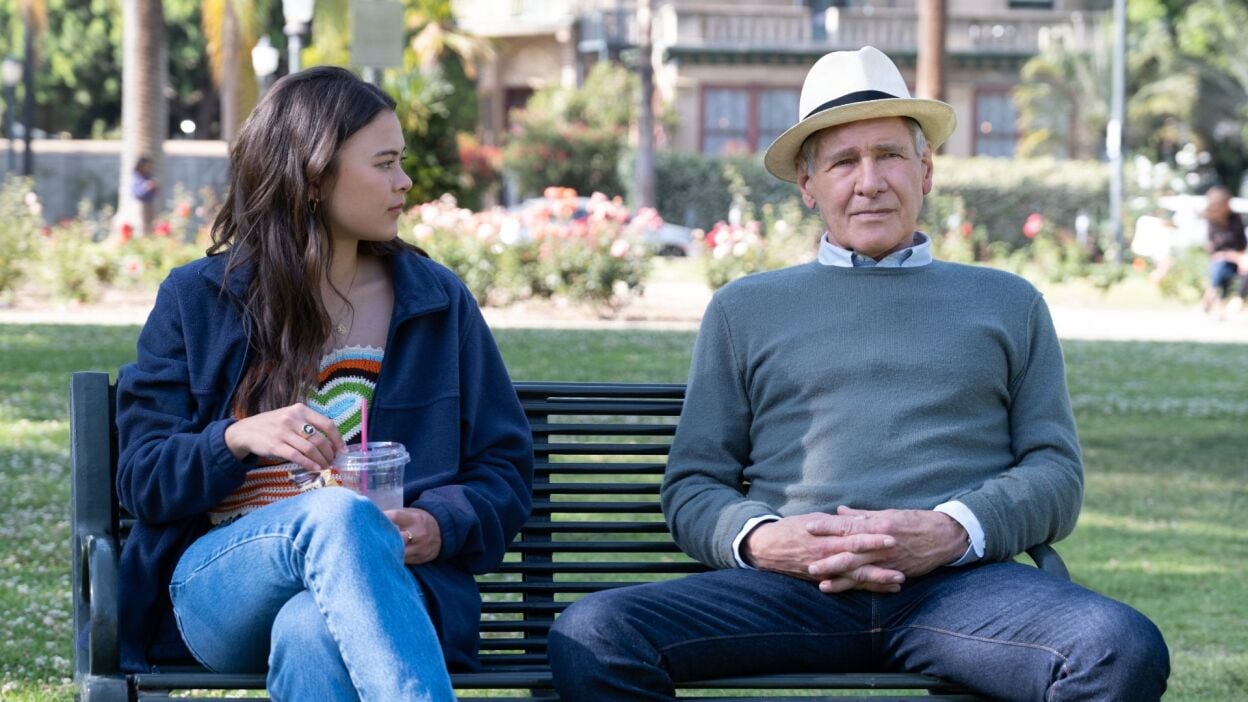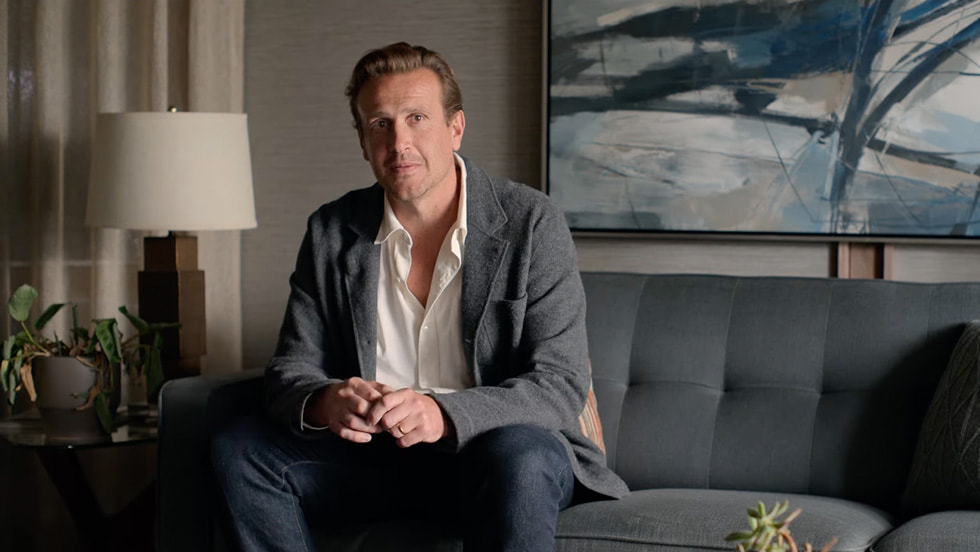shrinking

I’m going to write about the television show Shrinking, which is mostly pointless because it’s on Apple TV, and you don’t have Apple TV unless you’re obsessed with Severance, or you subscribed to watch Ted Lasso and never got around to unsubscribing. (Do that now, they don’t need your $9.99 a month.) I guess there are a couple other things on Apple TV that have captured some attention, but not many, and I’m not sure how I found Shrinking except that it was probably one of the “If you liked Ted Lasso you’ll like …” suggestions, and here I am.
Well that and Harrison Ford, who is not really what I want to write about, but before I get on with the main thing I want to honor the comedic chops of Harrison Ford. It has always been so, back to his breakthrough in Star Wars and probably American Graffiti before that, although I think I haven’t watched American Graffiti since seeing it at the Strand Theater on its first release. (Note to self.) And certainly as Indiana Jones. It was gruff, world-weary humor, the why-do-I-have-to-put-up-with-this schtick, and maybe it would have gotten tiresome if that was all we saw, the way I have utterly run out of patience with Tom Hanks’s earnestness. But outside of the franchises, Ford was always showing up in one-dimensional action roles, like the president in Air Force One, or cast opposite women who were way too young for him (Six Days, Seven Nights), and although he has unquestionably been a star and an icon, I don’t think he has quite ever gotten his due, the way Humphrey Bogart has. Bogart is the actor he reminds me of the most: he is (or ought to be) Bogart’s one true successor. Bogart really only had one note, too (and was also constantly being cast with women who were way too young for him), but he has a reputation in the first rank of movie actors, which I don’t think Ford ever has been accorded.

Maybe I’m alone in this opinion, I don’t know what other people think.
Anyway, Shrinking. (I’m going to try to keep this spoiler-free, because you might end up resubscribing to Apple when the new season of Lasso comes out, but I might slip up once or twice.)
Shrinking centers on a psychotherapist named Jimmy, played by Jason Segel, who is grieving the death of his wife while trying to raise their high-school age daughter, and failing at both. Jimmy’s off the deep end in his grief, which can happen, and which probably isn’t ideal for a therapist, but it’s comedic gold. Or, comedic something. None of it is really believable, and if you’re the sort of person who insists on comedy emerging from truth, rather than the Bugs Bunny antics that tend to provoke laughs in Shrinking, then this show might not be for you. As for me, what can I say, I was listening to The Barber of Seville on Saturday and kept cracking up during the overture because in my head I was hearing the lyrics “Why are you so vexed? Don’t you know you’re next?” And I have to rewind frequently while watching Shrinking because I’ve missed a line laughing out loud.
And yet, it’s not the laughs in Shrinking that I came here to write about. There is real heart in this show, totally separate from the laughter - almost walled off from the laughter, at times - and it has taken me a season and a half (I’m in the middle of Season Two as I write this) to figure it out. More than being the show the marketers want you to think it will be, about a goofy psychotherapist and his wacky but occasionally successful schemes, Shrinking is a show about flawed people doing their best. It comes through in the surrounding cast: in Jimmy’s patients, who include a woman being abused by her partner and a veteran returning from the Middle East; in his psychotherapy partner Gaby; in his next-door neighbor Liz. None of them have it together. A lot of their problems, especially Liz’s, are serious first-world problems - but not all of them, and anyway, everyone’s trauma is their own. And they’re doing their best, and it’s never enough, and because it’s television you can see the fuckup as they’re on their way to commiting it, and you so don’t want them to do that, and - yep, they did it.
Alice, Jimmy’s daughter, and equally grieving, is the perfect foil for this, because she’s a kid, and kids are supposed to fuck things up. Everybody else, the grown-ups - you kind of spend the show looking around for the grown-ups, and they’re not there. And that’s all of us. Well, I don’t want to speak for you. I keep waiting for grown up me to arrive and not do the obvious stupid thing that everybody else saw coming six months ago, and - yep.
What redeems the fuckups in Shrinking is that they keep being there for each other, despite the stupid obvious things. Obvious, stupid, and often hurtful. Not immediately; they tend to let each other have it. But sooner or later, and usually sooner, they forgive each other and lift each other up, because they know deep down that this is what it is to be human.
The interesting exception is Jimmy, who doesn’t quite get it: he looks this band of folks around him and keeps seeing people who have figured it all out. And sees himself and wonders why he hasn’t. His redemption will come - if it comes, if Shrinking doesn’t turn into a Pasadena Gilligan’s Island that this merry band will never be rescued from - when he realizes he doesn’t have to figure it all out.

And then there’s Ford, as Paul, the founder of the psych practice where Jimmy is a partner. At times he’s the deus ex corner office of Shrinking, a world-renowned expert with books with his picture on the cover, emerging from down the hall to issue sage advice and shake his head at these idiots he has somehow stuck himself with. Only to keep my promise of minimal spoilers will I not tell you the ways that, gradually, that image is revealed not to be entirely true. But the revelation of those aspects of Paul, and the way he confronts them, feel in a way like Ford’s other characters, Han Solo and Indiana Jones, finally growing up, finally facing the flaws they’ve been covering with annoyance and braggadocio and flings with women too young for them and, yes, with humor, all these years. Finally Ford gets a character who might be learning how to be himself, flaws and all.